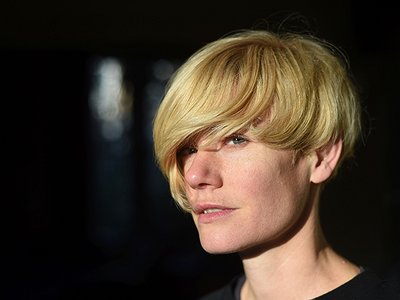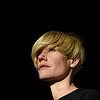Part 2
Could you take us through a day in your life, from a possible morning routine through to your work? Do you have a fixed schedule? How do music and other aspects of your life feed back into each other - do you separate them or instead try to make them blend seamlessly?
I do try to keep up a routine. When I’m disciplined, my alarm goes off at 830am. The first thing I do is write my morning pages. Then I get up, get dressed and have breakfast. Every second day I go for a 15km run. If it’s not a running day, I might take a little walk to clear my head before making my way into the studio.
Depending on what I have on, the day can be spent writing and recording vocals, composing, working on a remix, listening to promos or combing through Bandcamp in preparation for my radio show, DJ set or mix, or of course doing interviews!! I also earn extra money copywriting, so I might be tackling that. I enjoy having a few things on the go. My mind bounces about from one idea to the next so I need to keep my days varied. I’ll dabble a bit in one thing then move on to something else. I keep working til dinner time and sometimes head back up to crack on through the evening.
There’s also something I call my dailies. I’ll set a timer for 20 minutes and type prose. It can be anything, no pressure - thoughts on my mind, ideas for a story or song, just describing pictures on the wall or the view from my window. My morning pages often recount dreams and this other exercise is just another way to get words down. I misplaced a full lyric book at the end of the year which shook my arse into gear … you can never have enough content to draw inspiration from!
Could you describe your creative process on the basis of a piece or album that's particularly dear to you, please? Where did the ideas come from, how were they transformed in your mind, what did you start with and how do you refine these beginnings into the finished work of art?
I think the piece I’m most proud of at the moment is my new album, ‘Crossing Prior Street’. I started writing it during a transition period, where I was spending a lot of time reflecting on my past as well as planning a new future. It’s a really personal LP and as the songs took shape, I began to realise I might be able to construct a cohesive narrative with them. At first the idea was vague, but by the time everything was mixed, only one track-list made sense. For once I didn’t struggle to find a title and I knew exactly what to do with the artwork. The whole thing came together as effortlessly as possible, and the result feels like the most coherent thing I’ve ever done. Fingers crossed at least a few people listen to it start to finish.
There are many descriptions of the ideal state of mind for being creative. What is it like for you? What supports this ideal state of mind and what are distractions? Are there strategies to enter into this state more easily?
God if only I knew. I couldn’t really say where it comes from, but my creativity definitely manifests itself in bursts. It feels like a precarious and fragile state of mind, one I need to harness and make the most of as and when I’m on a roll.
Daily routine becomes even more important when I’m struggling to find inspiration. I can get quite disciplined with myself during a dry patch, enforcing all sorts of rules to try and get back on track, ie making sure I’m doing those timed 20 minute dailies, making sure I’m writing at least one page in the lyric book (even if it’s shit), plus no telly or films in bed. If I need to wind down, I’ll only allow myself to do so with a book. I also think running helps. Of course sometimes I do just grind to a halt and lose all motivation. When I’m really in a rut, I’ll give myself a few days of proper downtime before gradually reintroducing the drill sergeant.
How is playing live and writing music in the studio connected? What do you achieve and draw from each experience personally? How do you see the relationship between improvisation and composition in this regard?
The studio and my live set are intrinsically connected - both use the same software and totally tie in to each other. Of course composing is a lot more playful and varied, but many of the parts I write end up in the session. The way my live is set up, there’s still a lot of structural flexibility. I can modify the arrangements during a performance but I wouldn’t say I fully improvise in a traditional sense. Aside from a few variables, things are pretty well mapped out and rehearsed in advance. I’m not a trained musician and have a lot of things to do at once - trigger and control Ableton via a standalone unit, play keyboards, play percussion and sing. Being well prepared allows me to relax into the set, which in turn helps to achieve that all important pinnacle - connection with the audience.
How do you see the relationship between the 'sound' aspects of music and the 'composition' aspects? How do you work with sound and timbre to meet certain production ideas and in which way can certain sounds already take on compositional qualities?
I generally start a song really simply, forming a loose arrangement with a few basic elements. Once that blueprint’s in place, I begin building up different sounds. Often I’ll start with something elemental, say a maraca sample, and through various plug-ins start transforming it. The result can end up sounding completely different and suddenly be something I want to feature prominently. This in turn can send the composition down a completely different path. It’s a constant process of trial and error - introducing new sounds, modulating them, pasting in and carving away, until I feel the track makes sense.
Our sense of hearing shares intriguing connections to other senses. From your experience, what are some of the most inspiring overlaps between different senses - and what do they tell us about the way our senses work? What happens to sound at its outermost borders?
Wow that’s a big one - I think generally our senses interact and the way we experience our surroundings depends on that plurality. We all encounter this on a daily basis - taste blends into smell, sight into sound, pain into pleasure. I personally link musical tones to colour. Knowing how they fit together is like creating a paint palette. Certain shades clash and I view discord in a similar way - I see the colours in my mind and know immediately if the tone’s a wrong hue.
Of course in the right context, this dissonance can provide an intriguing, unexpected jolt, but you need to use it sparingly.
Art can be a purpose in its own right, but it can also directly feed back into everyday life, take on a social and political role and lead to more engagement. Can you describe your approach to art and being an artist?
I don’t really think of myself as an artist. Maybe it’s imposter syndrome or maybe it’s the fact the world’s brimming with creatives - the label feels a bit loaded. In saying that, I would say art is life. The way our social interactions and politics play out can seem like one big performance piece. It’s something I’m experiencing more and more, with each new turn of the sun.
It is remarkable, in a way, that we have arrived in the 21st century with the basic concept of music still intact. Do you have a vision of music, an idea of what music could be beyond its current form?
Sorry, can you please repeat the question?






